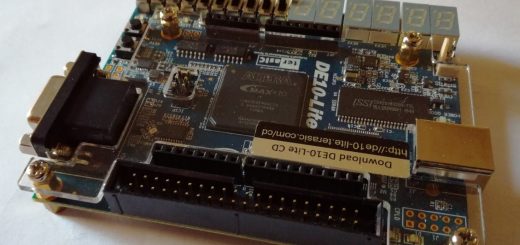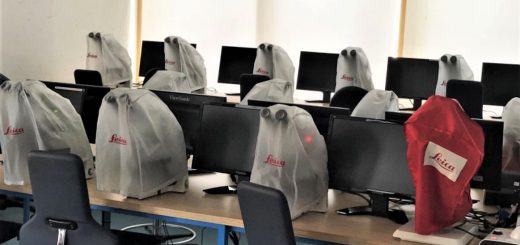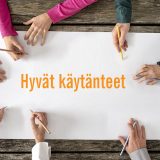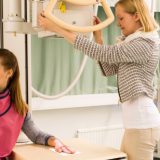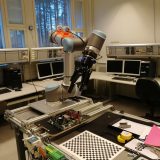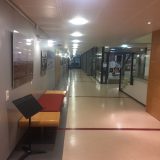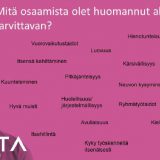Face-to-face meetings enhance international cooperation and bring ideas to student engagement
Oulu University of Applied Sciences has over 200 international partner universities. Usually the communication between international services is done via emails and occasional phone calls, but the EAIE conference held in Helsinki this September offered many possibilities for face-to-face meetings. We were able to hear news and views on international affairs from colleagues around the globe.
The EAIE, the European Association for International Education, is the European centre for expertise, networking and resources in the internationalisation of higher education. The organisation is non-profit and aims to serve individuals actively involved in the internationalisation of their institutions. The annual EAIE conference attracts professionals around the world, and the Helsinki conference was the biggest ever with over 6 200 participants.
Plans with the Partners
Oamk’s team from the International Services attended the conference for four days. Altogether we met over 50 partners during the conference! We also met several other colleagues and professionals when browsing the exhibition area, attending sessions and networking during breaks. Especially inspiring and interesting were the meetings with our closest partners.
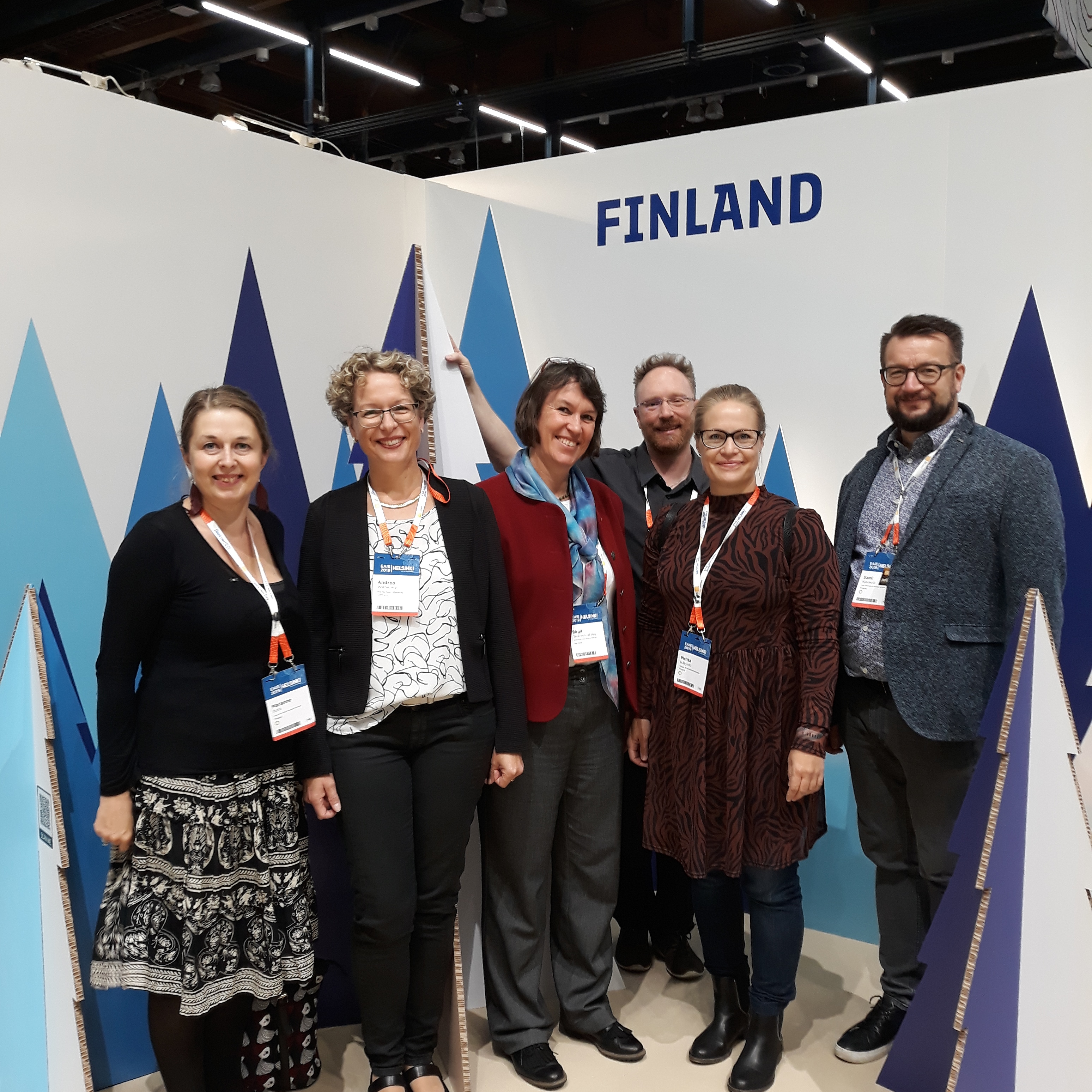
PHOTO: Marianne Isola, Andrea Wilhelmy (Offenburg University of Applied Sciences), Birgit Teubner-Jatzlau (Offenburg University of Applied Sciences), Bastian Fähnrich, Piritta Nätynki & Sami Niemelä at the Finnish stand in the EAIE conference
Baden-Württemberg Cooperative State University (DHBW) from Germany has been our partner for several years. There are exchange students studying in both institutions every year. DHBW is located in number of towns in Baden-Württemberg. The semester in DHBW is divided into four periods, so three-month-long exchanges are easy to organize. International relations officer Ms. Ingela Lundin told us that the selection of courses is vast with a couple of core courses and several elective courses in every period. The program also offers exciting possibilities for other than business students. During the exchange you can do basic courses in business without any previous knowledge.
The Salesian University School of Sarrià (EUSS) from Spain that has been organised as a separate entity under the Universitat Autónoma de Barcelona, is a young and innovative university specialised in industrial engineering. They offer Bachelor’s degrees in engineering in renewable energies and energy efficiency, electronics engineering, mechanical engineering and industrial management engineering. EUSS has previously, already in 2017, sent one of their staff members, Ms. Olga Vendrell to our International Teacher and Staff Exchange Week (ITSEW). Apparently Olga was very impressed about what and how we are doing at Oamk, as she had proposed Mr Jordi Cruz Sanchez who is responsible for international relations at EUSS Oamk to be a good partner for them. Jordi got in contact with the International Services well before the EAIE so we were able to do our homework and consulted the appropriate departments already before the EAIE. We met Jordi Cruz Sanchez at the EAIE and got introduced to their educational philosophy “engineering by doing”. EUSS’s degree programmes for engineers are structured from the perspective of development of professional skills of the students and they are thus very interesting and suitable also for university of applied sciences students. After the EAIE the contacts have remained active and a new Erasmus+ cooperation agreement in the fields of mechanical and energy engineering is being signed.
De Montfort University (DMU) from UK sends and receives thousands of exchange students every year. No wonder, because for example this Autumn all the exchange students are going together to premier league game together, hosted by DMU! The discussions with Mr Leo Smith, Head of #DMUglobal, focused mainly on Brexit and its implications. DMU intends to respect all the old exchange agreements, but they are not really aware what is going to happen in real life, as the Brexit information tends to change.
Ideas for student participation
This year, the conference theme was “Encompassing all voices”. Indeed, we paid attention to talks on student guidance and counselling, inclusion of different people in mobility, marketing for all the interest groups. There were also plenty of opportunities to attend to topics affecting the whole higher education environment and society at large, such as digitalisation and sustainable development.
While attending the conference sessions and talking (face-to-face) to colleagues about designing international mobility processes and digital services for students, a simple truth was addressed: listen to students. It seems that some of our partners abroad are much more experienced with this. In some of our talks, they encouraged us not only to listen to, but also to involve students when designing digital services. After all, the services that we are using should work for everyone’s benefit regarding the mobility processes and experience on the whole.
A good start is to ask questions to students: What kinds of needs do they have before, during and after their international mobility? Are the needs that we have identified for the students up-to-date and accurate? Do the digital services that we are devising really meet the needs of students? How do students perceive the digital services that we are currently setting up for them? Do our digital services actually facilitate and govern the students’ mobility processes in a reasonable way according to students? Do students possibly have even better ideas for digital services, such ones that may make the entire mobility and learning processes even smoother and more purposeful?
We concluded that we could learn quite a lot if we only dared to ask questions from our students, or even asked them to participate in the service design process. Of course, it takes time and effort to attend to all possible people and voices, especially, to those of students. But in our understanding and according to our colleagues with whom we met during the conference, there seems no better way. There is only an even harder way (even though this is sometimes a good way to learn): finding out at some stage that we should have listened to students a long time ago.
In addition to digital services in international mobility, we attended sessions and talked about other topical issues concerning the internationalisation of higher education. These talks challenged us to reason about the very purpose of international mobility and student learning from an educator’s point of view. We listened to and took part in quite lively discussions on questions such as: Why do we encourage students to go abroad for studies or a traineeship? What and how do students learn from an exchange abroad? Or how can they also learn at home to become international, when being exposed to a classroom with people from different countries and disciplines? How can we prepare students for encountering different cultural voices during their exchange, or on and off our own campuses? In which ways can we help students to reflect on their mobility experience, and get a better learning outcome?
Based on quite a few conference presentations and talks, we came also to understand that the term ‘international’ seems to be slowly replaced by the word ‘global’: Are we still talking about internationalisation, or is our talk about globalisation? What about global learning and global education? How can we get our students (and all of us, including ourselves) to learn the skills required in the 21st century world, whether we are bound to our local environment or being mobile and jetting around the globe (not by airplane anymore, of course)? Are our universities’ strategies, action plans and curricula meeting the needs of today’s world, and how can we better serve these needs? These were just but a few questions that we encountered at the EAIE conference. We surely keep on reasoning and encourage everyone to come up with more questions, and perhaps even join the conversation to find possible answers. We hope that you and everyone else may perk up your ears – let’s not shut anyone up, but rather make all our voices heard, and keep the conversation going!
Bastian Fähnrich, International services
Marianne Isola, International services
Sami Niemelä, International services
Piritta Nätynki, International services
Pysyvä osoite: http://urn.fi/urn:nbn:fi-fe2019111137607


